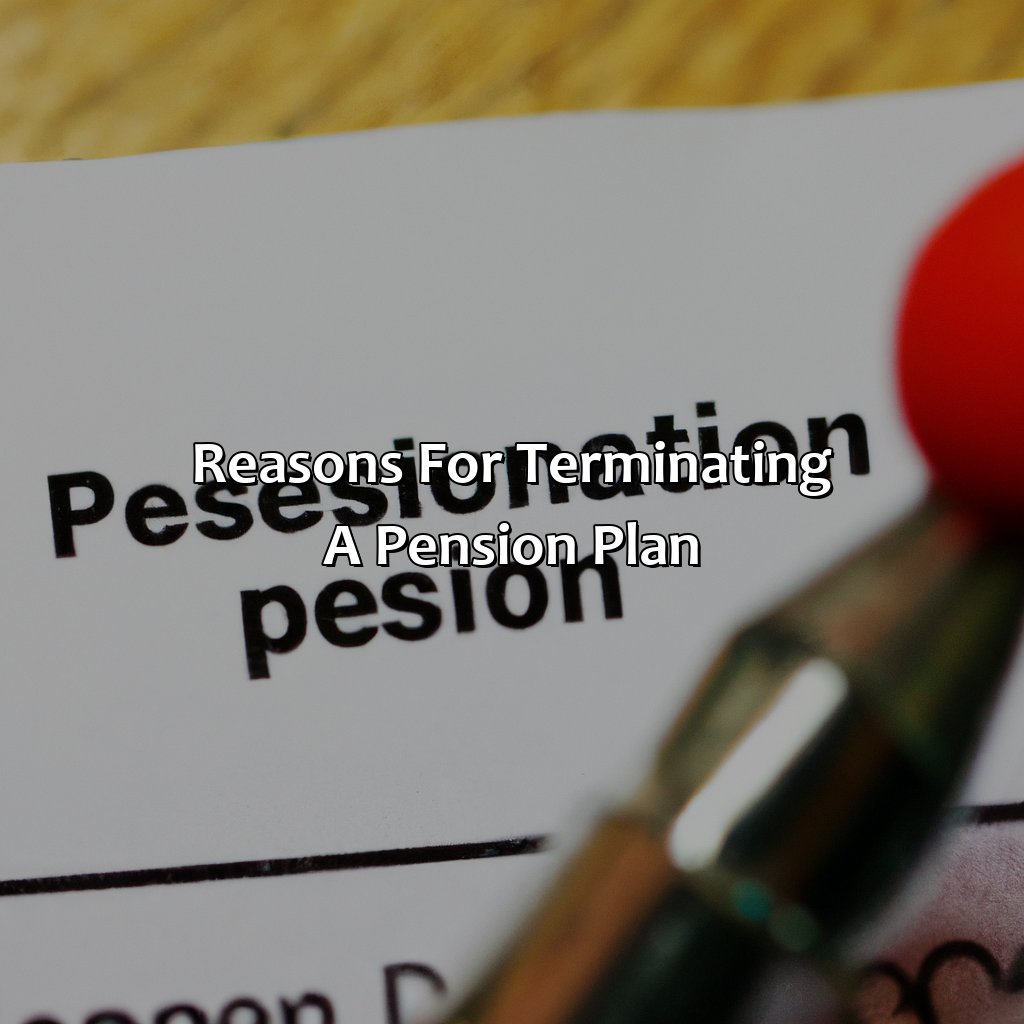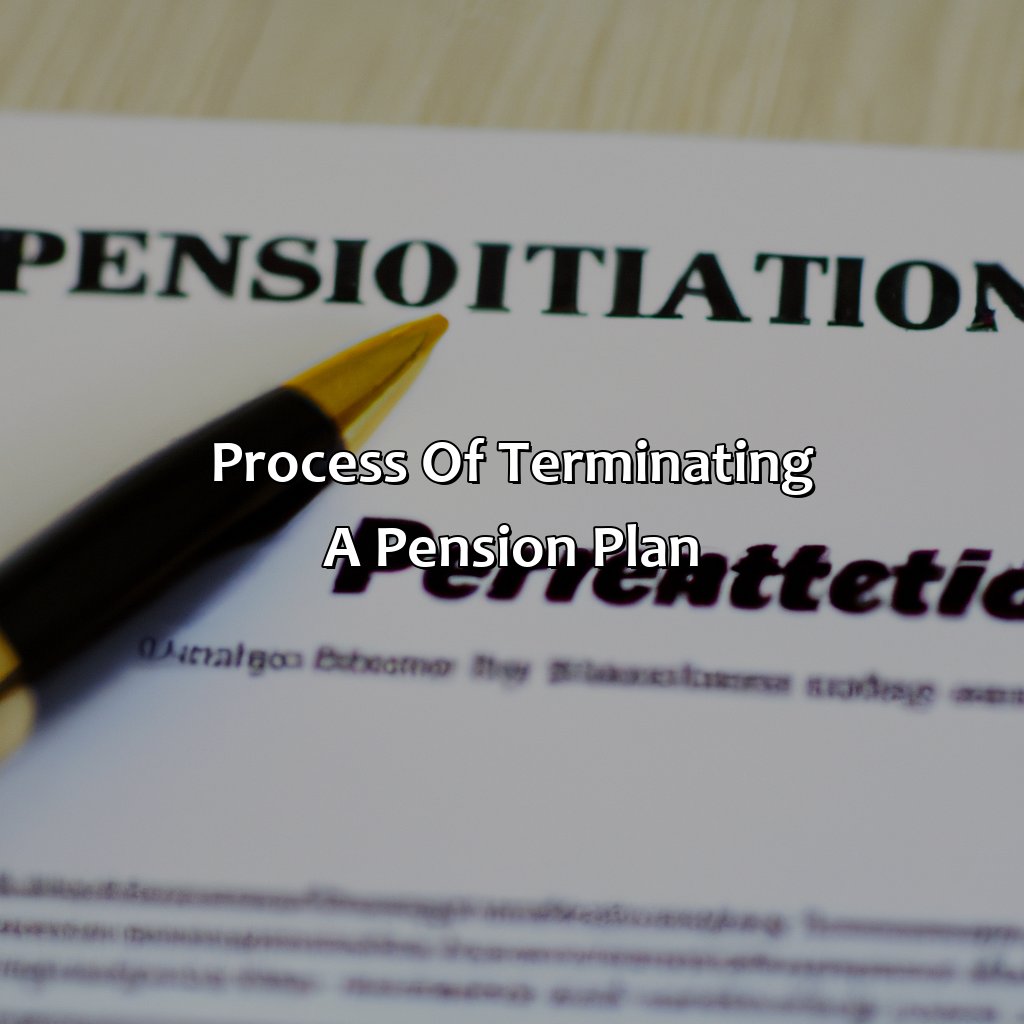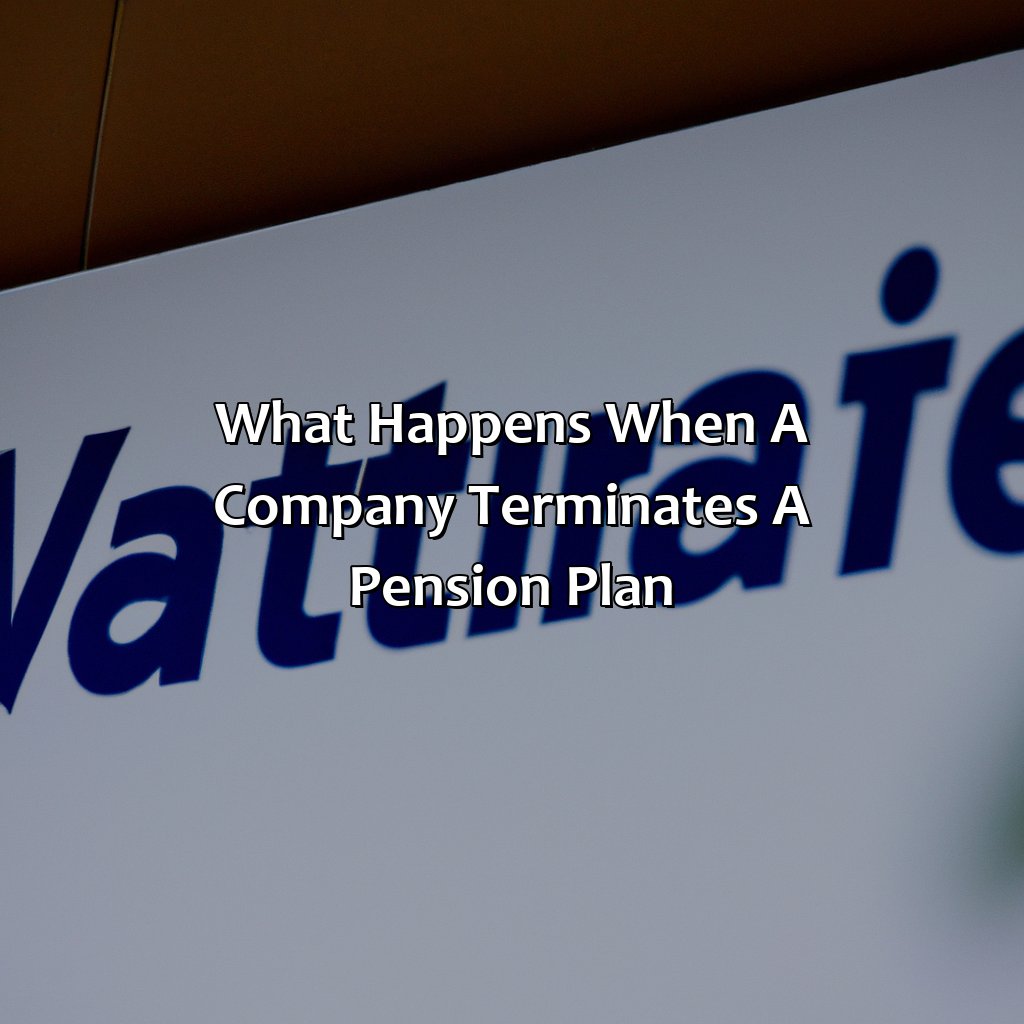What Happens When A Company Terminates A Pension Plan?
Key Takeaway:
- Termination of a pension plan can be due to financial or legal reasons, such as the company’s inability to continue funding the plan or changes in government regulations.
- During the process of terminating a pension plan, participants must be notified and given options for receiving their benefits, such as receiving a lump sum payment or rolling over the funds into another retirement account.
- Participants may experience a potential reduction in benefits due to the termination of the pension plan, but they also have the option to continue saving for retirement through other means, such as a 401(k) or IRA.
Are you concerned about your retirement savings when a company unexpectedly terminates their pension plan? This article will discuss the various options available to you and how to manage your finances. You can take control of your future security with the knowledge provided here.
Reasons for Terminating a Pension Plan
A Pension Plan may be terminated for multiple reasons, such as when an employer goes out of business or when the plan becomes too expensive to maintain. Another reason could be if the Pension Plan becomes overfunded, meaning the amount of money in the plan exceeds the amount necessary to pay out future benefits. In such cases, the sponsor may choose to distribute the excess funds to participants.
Terminating a Pension Plan requires specific legal procedures and can involve different steps depending on the type of plan.
If a company goes bankrupt, what happens to the pension depends on whether the company is reorganizing or liquidating. In a reorganization, the company may be able to continue its pension plan or transfer the obligations to a new plan. In a liquidation, the Pension Benefit Guaranty Corporation may take over the plan and pay benefits up to a certain amount. It is important for employees to know their rights and options when it comes to their pension in these situations.
During the termination process, funds are distributed to participants either as a lump sum or in the form of an annuity, which translates into regular payments over time. The cost of these payments is covered by the Pension Benefit Guaranty Corporation (PBGC) for single-employer plans, unless the plan has sufficient assets to cover the payments. For multi-employer plans, the PBGC’s coverage is generally limited. In some cases, participants may receive less than the expected benefits if the plan’s assets are not enough to cover the promised benefits.
It is important to note that Pension Plan termination can impact the current employees and retirees who depend on the benefits promised by the plan. For example, in 2018, Toys “R” Us faced massive backlash after terminating its Pension Plan, which left approximately 30,000 participants without promised benefits. This case highlights the legal and ethical implications of Pension Plan termination and emphasizes the importance of careful consideration prior to making such decisions.

Image credits: retiregenz.com by Harry Duncun
Process of Terminating a Pension Plan
Pension Plan Termination: An Overview
Terminating a pension plan is a crucial process that requires meticulous attention to detail. It involves an array of steps that pension plan sponsors and administrators must follow to ensure compliance and minimize errors. Here is a guide on what happens to your pension when you leave a company in five steps:
- Review Plan Documents – Reviewing and understanding the pension plan’s provisions, guidelines, and rules are crucial before initiating plan termination. This step involves identifying potential issues that may affect the termination process and how to address them.
- Notify Participants – The next step is to notify all plan participants and beneficiaries about the plan termination. This communication must include details of the plan’s termination date, the distribution options available, and the deadline for choosing an option.
- Secure the Plan’s Assets – After notifying the participants, the plan administrator must secure the plan’s assets. This step includes assessing the plan’s financial status and seeking professional assistance with appropriate investments, distributions, and transfers.
- Pay Benefits – Once the plan’s assets are secure, the next step is to distribute the plan’s benefits to participants and beneficiaries. This step involves choosing the appropriate distribution option and following the IRS regulations and guidelines.
- File Required Documents – The final step of a pension plan termination involves filing the necessary documents with the IRS and the Pension Benefit Guaranty Corporation. These documents include Form 5310, Form 1099-R, and the plan’s final valuation report.
As you work through the five-step process above, it is essential to remember that the termination of a pension plan is one of the most crucial events in a plan’s life cycle. Some unique details worth considering include the impact of plan termination on plan participants, tax implications for both the employer and the plan participants as well as the legal and regulatory requirements of plan termination.
\n
To minimize errors during the plan termination, here are some suggestions;
- Plan Early Plan administrators should plan the termination process well in advance to ensure adequate time for completing all the required steps.
- Seek Professional Assistance The process of terminating a pension plan can be complicated and time-consuming; thus, securing professional assistance from lawyers, accountants, and tax professionals can make the process less daunting.
- Communicate Effectively Clear communication with plan participants is key to ensuring a smooth and successful plan termination. Ensure that all communication channels are effective, including email, mail, and phone.

Image credits: retiregenz.com by Yuval Woodhock
Impact on Participants
When a company terminates its pension plan, the impact on participants can be significant. Participants may lose accrued retirement benefits and face financial hardship. Due to contractual terms and market conditions, the amount of benefits received may be reduced or even eliminated. Furthermore, participants may have limited options to protect their retirement savings.
To mitigate the risk of losing retirement benefits, participants can explore options such as:
- Rolling over their pension funds to an IRA
- Negotiating with their employer for a lump-sum payment
- Considering alternative savings strategies
These alternatives require careful planning and decision-making, but can ultimately help participants secure their financial futures.

Image credits: retiregenz.com by James Woodhock
Five Facts About What Happens When a Company Terminates a Pension Plan:
- ✅ When a company terminates a pension plan, employees will no longer accrue benefits under the plan. (Source: Investopedia)
- ✅ The Pension Benefit Guaranty Corporation (PBGC) may step in to provide some level of pension benefits to participants in termination cases. (Source: AARP)
- ✅ Employers may offer lump-sum payouts to employees who have accrued benefits under the terminated plan. (Source: Nolo)
- ✅ Terminating a pension plan may provide cost savings for the employer, but may also impact employee morale and company reputation. (Source: The Balance)
- ✅ Employers must follow specific legal requirements and procedures when terminating a pension plan, including notifying plan participants and providing adequate time to consider options. (Source: IRS)
FAQs about What Happens When A Company Terminates A Pension Plan?
What happens when a company terminates a pension plan?
When a company terminates a pension plan, it means that the plan will no longer provide retirement benefits to its participants. The employer will typically distribute the assets of the plan to the participants or purchase annuities to provide future retirement income.
How are pension plan assets distributed when a company terminates the plan?
When a company terminates a pension plan, the assets of the plan are distributed to the participants. The method of distribution depends on the terms of the plan and whether the plan is fully funded or underfunded. Participants may receive a lump sum payment or monthly payments over a period of time.
What happens to the employees’ vested benefits when a company terminates a pension plan?
When a company terminates a pension plan, employees’ vested benefits are protected under the Employee Retirement Income Security Act (ERISA). Employees with vested benefits are entitled to receive the benefit they have earned, and the company must maintain enough money in the plan to pay these benefits.
What happens to the unfunded liabilities of a pension plan when a company terminates it?
When a company terminates a pension plan that is underfunded, the employer is responsible for paying the unfunded liabilities. The employer may choose to pay the amount owed in a lump sum or over a period of time. If the employer is unable to pay the unfunded liabilities, the Pension Benefit Guaranty Corporation (PBGC) may step in to provide financial assistance.
What happens to the PBGC insurance coverage when a company terminates a pension plan?
When a company terminates a pension plan, any PBGC insurance coverage associated with the plan will terminate. However, the PBGC may step in to provide financial assistance to the participants if the employer is unable to pay the vested benefits.
Can a company terminate a pension plan without providing any benefits to the participants?
No, a company cannot terminate a pension plan without providing benefits to the participants. ERISA requires that employees with vested benefits receive the benefits they have earned under the plan, regardless of whether the plan is terminated.
